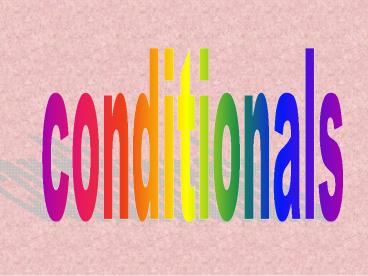conditionals PowerPoint PPT Presentation
Title: conditionals
1
conditionals
2
There are three basic conditionals that we use
very often. There are some more conditionals that
we do not use so often.
First Conditional Second Conditional Third
Conditional
3
The structure of conditional
- First Conditional
If
future simple (will vb-base form)
subj present simple, subj Unless
may/might
base form imperative
- Second Conditional
If
would subj past simple,
subj vb- base
form Unless
could/might
4
- Third Conditional
If
would have subj past
perfect, subj
participle Unless
could/might have
5
First conditional
- This expresses what will happen if the condition
indicated.
EJ If I finish the project soon, I will go to
the cinema with you.
- We can use modal May and Might or the verb in the
imperative.
EJ If the library is open, I may / might borrow
a book
6
If the senteces are negative
To deny the verb of the condition
To use it in conjunction with affirmative unless
(if not)
EJ He wont believe anything unless we prove it
is true
7
Second conditional
- The conditional concernes the present but its
hypothetical, in other words, its almost
impossible to occur.
EJ If you told him, he would understand the
situation.
- If the verb TO BE appears, in all persons we must
use WERE.
EJ If that camera werent so expensive, I would
buy it.
- When we give an advice, we must use the pronoun
WERE, instead of I.
EJ If I were you, I would ask my parents for
permission
8
Third conditional
- In this case the sentences also express a
condition in the past and the hypothesis cant be
possible.
EJ You would have learnt to play the guitar
sooner If you had taken classes
- The variants to form the third condiconal are
perfect manners.
Could have participle
Might have participle
EJ If we had bought the tickets on time, we
could / might have gone to the cinema
9
Prayer time
The same structure as the first conditional
conjunctions change
EJ When I get home, Ill call you
EJ I will buy a car as soon as I pass my driving
test
10
Wishful
11
The structure of Wishful
Wish / if only past simple
Wish / if only past perfect
Wish could / would base form
wishful prayers expressed a desire, can be formed
in two ways
12
Past simple
- In this tense situations we refer a present
situatio that we would change.
EJ I wish / If only I were more responsible
- If the verb TO BE appears, in all persons we must
use WERE.
EJ I wish / If only it were that simple!
13
Past perfect
- In this situation we refer to a past situation
that we had wanted to change.
EJ I wish / If onlyearlier!
14
Could or Would
- In this time we refer to a future situation
expressing the hope that this situations will
happen.
EJ I wish / I could pass the literature test
- If the subject of "whish" and the verb in base
form are different, we use "would"
EJ I wish / If only the weather would improve
15
Match the beginning of each sentence in I to a
suitable ending in II.
...... a. if you had apologised. ...... b. he
may visit a castle. ...... c. life would have
been easier. ...... d. he had more free
time. ...... e. if you lived nearer. ...... f. he
can watch television. ...... g. if you want to
come.
1. Jim wishes 2. Id be delighted 3. If he
hadnt been poor, 4. If he finishes his
homework, 5. Let us know 6. If he goes to
Scotoland, 7. She would have been pleased
16
Rewrite the sentences using the words in brackets.
1.-She should have listened to the doctor. (if
only)
If only she had listened to the doctor.
.
2.-We didnt meet you because we didnt know the
train time. (if)
If we had known the train time, we would have
met you.
3.-Sam always has to rush because he gets up
late. (earlier)
If Sam got up earlier, he wouldnt have to rush.

